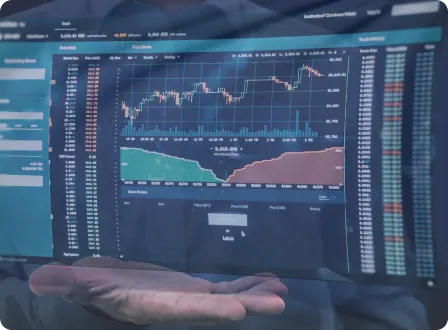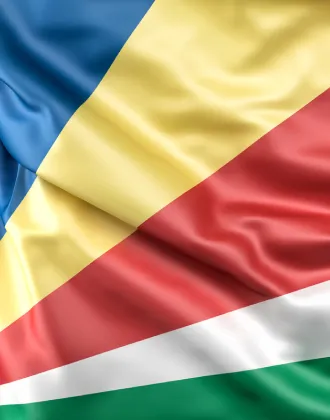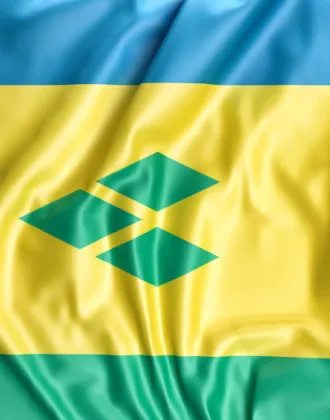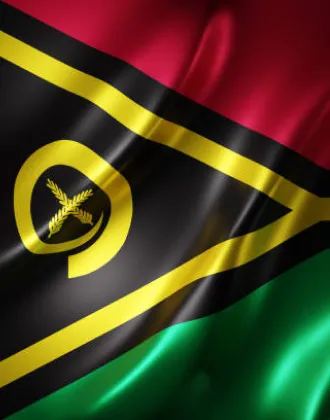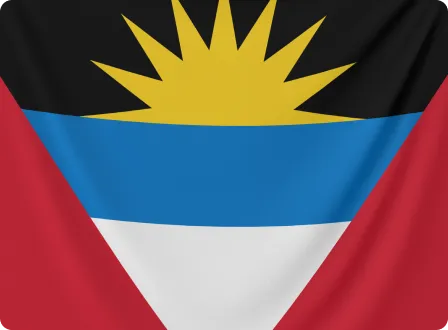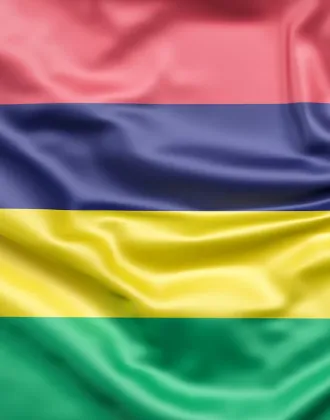
Forex license in Dominica
Forex brokerage is a vast field, which attracts many entrepreneurs. To legally operate in this field, it is necessary to register a company and obtain the appropriate license. The Commonwealth of Dominica, located in the Caribbean, is becoming an increasingly attractive choice for opening a forex brokerage business. Gofaizen & Sherle is ready to provide comprehensive assistance in registering a forex brokerage company in Dominica and other jurisdictions.
Dominica, an island nation in the Lesser Antilles, has long been known as an attractive jurisdiction for forex brokers and financial companies in the Caribbean. The country, formerly a British colony, still maintains a legal system based on English law and has English as its official language.
Dominica boasts developed sectors in agriculture, tourism, construction, offshore and other services. This ensures stable growth and diversifies sources of income. Also, the Commonwealth of Dominica is a beneficiary of the U.S. Caribbean Basin Initiative, which allows it to export many goods to the United States duty-free. Dominica is also a member of the Caribbean Community (CARICOM), the Caribbean Common Market, and the Organization of Eastern Caribbean States (OECS).
Dominica is an offshore zone, meaning foreign companies registered in this jurisdiction can operate without paying corporate tax, value-added tax (VAT), and other taxes. At the same time, the Dominica government has a strict confidentiality policy, which guarantees the protection of information about the owners and beneficiaries of companies.
Forex trading is legal in Dominica. This means its citizens and residents have the right to engage in forex trading. The population of the country is about 71,808 people, which makes it a potential audience for forex brokers. It is important to note that forex brokers in Dominica are not subject to regulation by government authorities. Some of the brokers may be members of independent dispute resolution organizations, but this is not mandatory.
Since there is no regulation of forex brokers in Dominica, it is an attractive jurisdiction for brokerage firms from different countries. It allows for quick and easy company registration. Moreover, it provides more flexible conditions for Forex traders and no restrictions on available leverage.
Apart from regular trading, Islamic forex trading is also legal and available in Dominica. Local Muslim investors should choose a forex broker that offers both standard and Islamic trading accounts to comply with Shariah principles when trading.
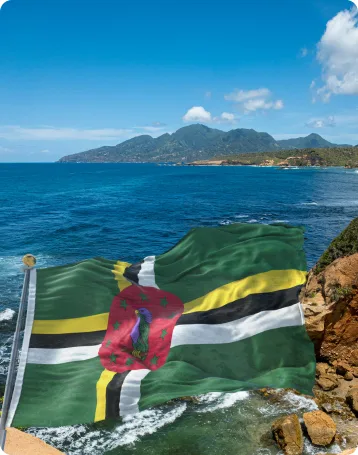
Find more information about the Forex license in Dominica
Advantages of the Dominica Forex License
Obtaining a forex license in the Commonwealth of Dominica offers several advantages:
Regulatory Environment
Dominica provides a favorable regulatory environment for forex brokers by offering a simplified process for obtaining a license.
Tax Benefits
The jurisdiction offers tax benefits for foreign companies, facilitating cost-effective operations. In addition, Dominica is subject to the Caribbean Community’s Double Taxation Avoidance Order 2008.
Privacy
Dominica maintains strict privacy laws, protecting the confidentiality of businesses and clients.
Quick timeframe to register and obtain a license
The entire process takes only 1 month.
No residency or local office requirements
Brokers do not need to have a physical office in Dominica or local employees.
Free annual audit
Financial dealers conduct an annual audit at no additional cost.
Confidentiality of trading strategy
Brokers do not have to disclose their dealing strategy, they can be market makers or STPs.
Small license renewal fee
The renewal fee is $25,000 (from the second year onwards).
Refundable authorized capital
The required capital to insure forex clients is $50,000, which is kept in a separate bank account and will be returned if the broker surrenders the license.
Cost-effectiveness
Obtaining a forex license in Dominica is cost-effective compared to other jurisdictions, making it an attractive option for startups and small businesses.
Access to the markets
With a Forex license in Dominica, brokers gain access to global markets, allowing them to offer services to traders around the world.
Requirements for obtaining the Dominica Forex License
To conduct forex activities in the Commonwealth of Dominica, it is necessary to register a company and, if necessary, obtain one of the licenses mentioned above. To do so, you must meet certain statutory requirements:
- register a legal entity;
- ensure a minimum share capital of US$50,000 (which will be kept in a separate bank account and will be returned if the license is surrendered);
- only one director is allowed for a local company, but financial services companies are required to have at least two directors. However, the same person can be both a founder and a director;
- no physical office requirements in Dominica;
- no requirements to have resident employees;
- obtain the FSF’s written consent to the appointment of all directors and executive officers (however, if the FSU believes that a director or officer is not qualified, it may prevent the FSU from approving such appointment);
- comply with anti-money laundering regulations;
- provide the FSU with an annual audited financial statement.
Open a Forex Company in Dominica
The process of registering any financial company, including forex related, in the Commonwealth of Dominica requires the filling out of the following steps:
Choosing a company name.
Step 1
Choose a unique name for your finance company that complies with local laws and is not already in use by another entity.
Company Registration.
Step 2
Register your company with the Companies and Intellectual Property Office (CIPO), the National Registry of Companies and Intellectual Property of the Commonwealth of Dominica.
The list of documents required to register a company with CIPO includes:
- constituent documents (articles of association of the company, memorandum of partnership);
- application for registration, which should contain information on the company name, its registered office, and authorized capital, as well as the names and personal details of the company’s management and shareholders;
- resumes of all directors and UBOs;
- copies of passports or other identification documents of all directors and UBOs;
- documents proving the addresses of all directors and UBOs;
- documents proving the address of the company’s registered office (copy of utility bill or bank statement);
- a valid professional letter of recommendation from a banker, lawyer, or accountant in your jurisdiction;
- payment of the registration fee, which depends on the authorized capital of the company.
If you are unable to apply for company registration in person, you will need to provide a power of attorney.
All necessary application forms and forms are available on the registrar’s website.
All documents must be translated into English and notarized.
The National Registry of Companies and Intellectual Property may require additional documents.
Obtaining the necessary licenses
Step 3
Determine the specific licenses required for your type of financial business in Dominica. For example, if your forex business will involve financial services, you will need to comply with the Financial Services Act and obtain the appropriate license. Virtual Asset Businesses also require licensing under the Virtual Asset Business Act.
Gofaizen & Sherle lawyers can help you determine the type of license you need.
Open bank accounts
Step 4
Open bank accounts for your finance company, including segregated accounts if necessary to hold customer funds and meet regulatory requirements.
Securing sufficient capital
Step 5
Deposit a $50,000 refundable authorized capital in a dedicated bank account to be used to secure the clients’ forex fund. These funds will be returned in case the broker decides to surrender its license.
Adherence to AML/CFT principles
Step 6
Develop and implement robust AML/CFT policies and procedures to comply with local requirements.
Once all regulatory requirements have been met and the application has been approved by the regulator, the company can begin brokerage operations.
Before registering a forex company in Dominica, it is important to consult with legal counsel to ensure that you comply with applicable laws.

Request more information about the Forex license in Dominica
Forex Lawyers in Dominica

Position
Senior Associate, Business Development Manager (FX & iGaming)Phone
+372 5477 0344
Position
Senior Associate, Head of Sales (FX and iGaming)Phone
+372 5300 1858Regulation of the Commonwealth of Dominica Forex License
The Financial Services Department (FSU) is the sole authority responsible for regulating financial services in Dominica. It is known for its strict supervision and operates under the authority of the Ministry of Finance. The FSU oversees all financial institutions including:
- credit unions;
- insurance companies;
- offshore banks;
- money service businesses;
- development banks;
- building and loan societies;
- gaming companies;
- companies engaged in forex trading.
Excluded are commercial banks and securities operations. In addition, the FSU performs anti-money laundering (MLSA) functions within its remit.
The current legal and regulatory framework governing financial companies is highly robust, reflects international supervisory standards, and complies with both regional and international regulatory and financial requirements. It includes:
- Companies Act No. 21 of 1994;
- International Business Companies Act No. 10 of 1996;
- Companies Regulations No. 12 of 2021 (Amendment 2023);
- Financial Services Division Act No. 18 of 2008.
Dominica complies with international financial regulations such as US FATCA, EU standards on international taxation, and FATF standards on anti-money laundering and countering the financing of terrorism, which has an impact on the activities of financial companies. In 2011, Dominica enacted the Prevention of Money Laundering Act No. 8 and the Anti-Terrorist Financing Act No. 9 (current amendments to the laws enacted in 2022 can be viewed here and here). In addition, the Dominica Department of Financial Services has developed AML/CFT Guidance for Money Services Business (current version dated January 28, 2022).
The laws of Dominica do not provide for the regulation of forex services as a separate type of business, and as such there are no specific regulations, corporate rules, statutes, licensing, rules of conduct, or consumer and investor protection mechanisms applicable to this area of business in the country. In most cases, licensing of forex activities in Dominica is also not required.
However, some companies that provide forex services may be subject to the Financial Services Act No. 8 of 2010, which is a piece of legislation that regulates the licensing and regulation of financial companies that provide money transfer services, check cashing, currency exchange, issuance, sale or redemption of money orders, and other services specified in the legislation. The law establishes the requirements for obtaining a license to perform financial services. It defines classes of licenses (5 classes in total), and conditions for their issuance.
The text of the Financial Services Act mentions the concept of “money services business”, which covers various types of financial transactions, including currency exchange and money transfer. Therefore, companies providing services in the Forex market and carrying out such operations are subject to this law and must comply with its requirements, including licensing, compliance with financial reporting, as well as other norms and standards established in the law.
Also in 2022, the Law on Activities with Virtual Assets No. 1 was adopted. The law requires registration and licensing of companies that provide virtual asset trading services. This may include forex brokers that offer trading services in cryptocurrencies or other virtual assets. In addition, the Act establishes financial reporting and auditing requirements for registered virtual asset companies and measures to protect the interests of their customers. Forex brokers providing virtual asset trading services are also required to comply with these requirements and obtain a license.
To find out whether you need a license to conduct legitimate forex activities in this jurisdiction, and what kind of license you need, contact Gofaizen & Sherle.
FAQ about the Forex License in Dominica
Is Forex Trading Legal in Dominica?
Yes, forex trading is legal in Dominica. There are no laws prohibiting individuals from participating in forex trading. However, it is worth remembering that forex trading is not explicitly regulated in Dominica. There are laws governing financial services, including those involving the transfer and exchange of money, but there are no specific rules regarding forex trading as a separate activity.
How to obtain a Forex License in Dominica?
Dominica has no regulatory framework for forex brokers. This means that there is no government oversight of the industry. As a result, there is no formal procedure for obtaining a Forex license in Dominica. However, Dominica does have laws on financial services and virtual asset activities that require the licensing of financial companies, including forex brokers. Requirements for obtaining these licenses include company registration, financial reporting compliance, and customer protection measures.
How much does it cost to get a Forex license in Dominica?
The cost of obtaining a license in Dominica can vary depending on several factors, including the type of license. For example, a license to operate with virtual assets will cost around $43,000 (entry fee of $10,800 and registration fee of $32,400). Also, do not forget about the returnable authorized capital of $50,000, which must be deposited in a special account. This amount will be used to provide a fund for clients in the Forex market and will be returned in case the broker decides to give up the license.
How long does it take to obtain a Dominica Forex License?
With all documents in place, the process of registering a company in the Commonwealth of Dominica and obtaining a financial business license takes only about a month.
Who is the regulatory authority for financial services in Dominica?
The only financial services regulator in Dominica is the Financial Services Department (FSU).
How can I open a bank account in Dominica?
It is possible to open a bank account in Dominica remotely. To do this:
- select a bank;
- prepare the necessary documents;
- visit the bank and fill out the forms;
- submit the documents;
- make an initial deposit (the minimum deposit in Dominica banks is usually $5,000);
- activate the account and obtain account details;
- sign contracts;
- obtain banking materials (bank card, checkbook, etc.).
Documents the bank usually requires:
- proof of identity (passport, driver’s license or national ID card);
- proof of address (e.g. a recent utility bill for the last 3 months);
- a completed application form.
Application forms for opening an account can be found on the website of the bank of your choice. Alternatively, we suggest visiting the website of the National Bank of Dominica.
The bank may also require a letter of recommendation from your current bank and a cover letter explaining why you want to open an account in Dominica.
Explore other Forex Licenses
Connect with our experts
Our experts will tell you how to do it as quickly and easily as possible.
By clicking the button, I confirm that I have read the privacy policy and consent to the collection and processing of my personal data in accordance with the GDPR rules.
to our news & insights
